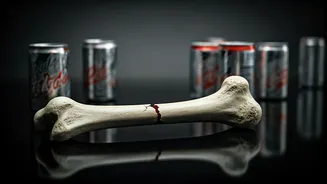Soda's Bone Impact
People frequently make a swap, choosing fizzy drinks such as cola over healthier options like milk and fresh fruit juices. This decision leads to a reduced
intake of essential minerals, proteins, and vitamins that would be available from healthier beverage alternatives. Milk is a significant calcium source, particularly in vegetarian diets; substituting milk could lead to calcium deficiency, thus leading to osteoporosis and periodontal disease. The damaging impact of diet soda on bones stems from the displacement of healthier alternatives. Soda drinkers tend to consume less milk and other fortified choices, thereby lowering their calcium and protein consumption, which are crucial for maintaining bone mass. Currently, adolescents and postmenopausal women are the two main groups at high risk of developing diet-related osteoporosis. These groups' entrenched nutritional patterns are a key concern. Furthermore, lifestyle choices associated with frequent soda consumption, including poor diet and a lack of physical activity, seem to amplify a person's susceptibility to poor bone health.
Sweeteners: A Concern?
Concerning artificial sweeteners and bone health, the current research is somewhat limited and inconclusive. Some experimental studies suggest possible impacts on the gut microbiota, which in turn impacts the absorption of nutrients like calcium. Based on current evidence, sweeteners have not been definitively linked to bone loss. Instead of focusing on the sweeteners themselves, it's more important to consider what these beverages replace, specifically nutrient-rich foods and drinks that support bone strength. The focus should be on building a diet rich in nutrients and maintaining good lifestyle habits for strong bones. It is crucial to drink cola beverages, whether regular or diet, in moderation, as their overconsumption has been linked to a reduction in bone mineral densities. Choosing low-fat milk, yogurt-based smoothies, or fortified plant-based alternatives will ensure the body receives enough nutrients to promote proper bone development. Vitamin D is essential for calcium absorption; regular sun exposure or supplements can maintain healthy levels. Activities such as walking, dancing, and even weightlifting can strengthen bones by encouraging new bone growth and enhancing density, as highlighted by Dr. Simon Thomas, Senior Director, Robotics Joint Replacements & Orthopedics Max Healthcare Shalimar Bagh.
Cola's Ingredients Matter
Interestingly, not all sodas have the same effect. Cola drinks, whether regular or diet, seem to be most associated with bone loss, possibly because of their ingredients. Colas often contain phosphoric acid, which can disrupt the body's calcium and phosphorus balance, both essential for bone remodeling. Furthermore, caffeine in colas increases calcium excretion through urine. This combination may reduce calcium availability over time, weakening bone strength. The dual effect may disrupt calcium availability, leading to weaker bones. However, fizzy drinks other than cola, like plain sparkling water, do not appear to have a significant negative impact on bone health.



















